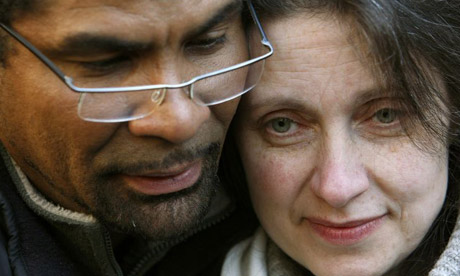
Britain's highest court will be asked to clarify the law on assisted suicide today when Debbie Purdy, who was diagnosed with progressive multiple sclerosis 14 years ago, demands a legal ruling on whether her husband would face prosecution were he to help her take her own life.
Purdy, 46, who has used a wheelchair for eight years, wants her husband, Cuban musician Omar Puente, to be able to accompany her to Switzerland, where assisted suicide is legal, without fear that he could be arrested on his return.
Her plea for clarification of the law has received support from a number of senior politicians, who believe legislation lags behind public opinion on the issue.
"It is probably a crime under the current law to assist somebody to go to a clinic abroad, but, as Debbie has rightly said, nobody is usually prosecuted," the former lord chancellor, Lord Falconer, said.
"It means that people like Debbie won't be sure that her husband, if he accompanies her, won't be prosecuted after she has gone to the clinic. In some cases, people have to go without their partners because of that fear."
Falconer told the BBC that people should not be dependent on the discretion of a prosecutor.
Under English law aiding and abetting suicide is a criminal offence punishable by up to 14 years' imprisonment.
In sympathetic rulings from the high court and court of appeal, judges have said it is up to parliament to change the law and that, in specific cases such as that of Purdy, prosecution and/or punishment of a helper was highly unlikely under the current code of practice for crown prosecutors.
The two-day appeal is being heard by five law lords. Purdy is opposed by the director of public prosecutions, Keir Starmer QC, who argues that the general code of practice is sufficient and he should not be required to issue specific policy guidelines.
The hearing before the law lords comes in the same week that the House of Lords, sitting as part of the parliamentary legislative process, is expected to debate the issue.
Falconer is expected to put down an amendment to the coroners and justice bill with the aim of removing the threat of prosecution from family members who accompany their loved ones overseas to euthanasia clinics.
He suggests that, to prevent abuse of the law and pressure being put on chronic sufferers to end their lives, two doctors should certify a patient is terminally ill and patients should declare their intentions before an independent witness.
Purdy, 46, from Bradford, West Yorkshire, claims that lack of proper guidance infringes her Article 8 right to private and family life under the European convention on human rights.
She was diagnosed with primary progressive MS in 1995 and has used a wheelchair since 2001.
Her legal action is supported by Dignity in Dying and she is a member of Dignitas, the Swiss organisation which operates specialist euthanasia clinics.
Purdy says she wants to "live for ever", but she is gradually losing strength in her upper body and plans to travel to Switzerland to end her life if her condition becomes unbearable.
Her lawyers argue that unless the law is clarified her life will be shortened as she will have to travel earlier because her husband will not be able to assist her without risking jail.
The director of public prosecutions has refrained from prosecuting in around 100 cases where family members have helped terminally ill patients travel to Switzerland to end their lives.

